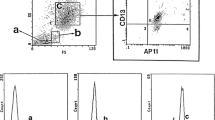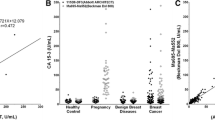Summary
Mucin-like cancer-associated antigen (MCA), a new tumor marker using the mouse monoclonal antibody b-12 is thought to be of value in the management of patients with breast cancer. In this study sera from 191 female patients with breast cancer (112 with progressive disease [PD] and 79 with no evidence of disease [NED]) were analyzed for MCA levels and compared with those of cancer antigen 15-3 (CA 15-3) in single determination and in combination with carcinoembryonic antigen (CEA) and tissue polypeptide antigen (TPA). A cut-off level of 14 U/ml for MCA seems to be more appropriate than the recommended 11 U/ml to distinguish between PD and NED in patients with breast cancer. Although there was a fairly good correlation of MCA to CA 15-3, MCA was inferior in sensitivity and specificity to CA 15-3. Patients with osseous metastases and those with more than one metastatic site showed higher MCA levels than patients with visceral or soft tissue metastases, a fact which was comparable to CA 15-3. Combining MCA and CA 15-3 resulted in a gain in specificity but marked loss of sensitivity. The combination of MCA and CEA results also in a loss of sensitivity whereas the combination of CA 15-3 and CEA showed an increased specificity and only a negligible loss of sensitivity. The combination of MCA with TPA is of little value in the follow-up of breast cancer, as is the combination of CA 15-3 with TPA. The combination of CA 15-3 with CEA can be still recommended for follow-up for early detection of metastases in breast cancer. Further investigations with MCA to determine the lead time of this new marker as well as its role as a possible monitor of the response to therapy are recommended.
Similar content being viewed by others
Abbreviations
- MCA:
-
mucin-like cancer-associated antigen
- CA 15-3:
-
cancer antigen 15-3
- CEA:
-
carcinoembrionic antigen
- TPA:
-
tissue polypeptide antigen
- NED:
-
no evidence of disease
- PD:
-
progressive disease
- mab:
-
monoclonal antibody
- RIA:
-
radioimmunoassay
- EIA:
-
enzymimmunoassay
- IRMA:
-
immunoradiometric assay
References
Bieglmayer C, Szepesi T (1985) First experiences with CA 15-3 — a tumor marker for breast cancer. In: Bastert G (ed) International symposium of monoclonal antibodies in clinical oncology. University of Homburg/Saar S 4 (Abstract)
Bieglmayer C, Szepesi T, Neunteufel W (1988) Follow-up of metastatic breast cancer patients with a mucin-like carcinoma-associated antigen: comparison to CA 15-3 and carcinoembryonic antigen. Cancer Lett 42:199–206
Bieglmayer C, Szepesi T, Neunteufel W (1988) MCA — ein neuer Tumormarker. Gynäk Rdsch 28 [Suppl 2]:203–205
Bombardieri E, Gion M, Mione R, Dittadi R, Bruscagnin, Buraggi G (1989) A mucinous-like carcinoma-associated antigen (MCA) in the tissue and blood of patients with primary breast cancer. Cancer 3:490–495
Colomer R, Sole LA, Navarro M, Encabo G, Ruibal A, Salvador L (1986) CA 15-3: early results of a new breast cancer marker. Anticancer Res 6:683–684
Delarue JC, Mouriesse H, Dubois F, Friedmann S, MayLevin F (1988) Markers in breast cancer: does CEA add to the detection by CA 15-3? Breast Cancer Res Treat 11:273–276
Fleiß JL (1973) Statistical methods for rates and proportions 3. Wiley, New York
Eskelinen M, Tikanoja S, Collan Y (1988) A new tumor marker MCA in breast cancer diagnosis. Anticancer Res 8:665–668
Hilkens J, Hilger J, Buijs F (1983) Monoclonal antibodies against human milk-fat globulin membranes useful in carcinoma research. In: Peeters H (ed) Protides of the biological fluids 31. Pergamon, Oxford, pp 1013–1016
Kufe DW, Nadler L, Sargent L (1983) Biological behaviour of human breast carcinoma-associated antigens expressed during cellular proliferation. Cancer Res 43:851–857
Kufe DW, Inghirami G, Abe M, Hayes D, Just-Wheeler H, Schlom J (1984) Differential reactivity of a monoclonal antibody (DF 3) with human malign versus benign breast tumors. Hybridoma 3:223–232
Makuch RW, Muenz LR (1987) Evaluating the adequacy of tumor markers to discriminate among distinct populations. Semin Oncol 2:89–101
Oehr P, Derigs G, Altmann R (1981) Evaluation and characterization of tumor-associated antigens by conversion of inverse distribution function values into specificity-sensitivity diagrams. Tumor Diagnostic 2:283–290
Paulick R, Caffier H, Kaesemann H (1986) Erste Erfahrungen mit dem monoklonalen Markersystem CA 15-3 bei Mammakarzinompatientinnen. Tumor Diagnostik Therapie 7:85–87
Pons-Anicet DMF, Krebs BP, Mira R, Namer M (1987) Value of CA 15-3 in the follow-up of breast cancer patients. Br J Cancer 55:567–569
Ruibal A, Encabo G, Colomer R, et al. (1985). CA 15-3 serum levels in clinical practice. Our experience in 1177 cases. XI. Congresso nazionale di oncologia (SIPDTT), 12–14 December 1985, Bologna, Italy
Sacks MPM, Stacker SA, Thompson CH (1987) Comparison of mammary serum antigen (MSA) and CA 15-3 in the serum of patients with breast cancer. Br J Cancer 56:820–824
Schlom J, Greiner J, Horan-Hand P (1984) Monoclonal antibodies to breast cancer-associated antigens as potential reagents in the management of breast cancer. Cancer 54:2777–2794
Schmidt-Rhode P, Schulz KD, Sturm G, Raab-Frick A, Prinz H (1987) CA 15-3 in breast cancer: first experiences with a monoclonal test system. Med Sci Res 15:765–766
Stähli C, Takacs B, Miggiano V, Staehlin T, Carman H (1985) Monoclonal antibodies against antigens on breast cancer cells. Experientia 41:1377–1381
Stähli C, Caravatti M, Aeschbacher M, Kocyba C, Takacs B, Carmann H (1988) Mucin-like carcinoma-associated antigen defined by three monoclonal antibodies against different epitopes. Cancer Res 48:6799–6802
Staquet M, Rosencweig M, Lee YJ, Muggia FM (1981) Methodology for the assessment of new dichotomous diagnostic tests. J Chronoc Dis 34:599–605
Steger GG, Mader R, Dittrich Ch, Moser K (1987) Consequences of the combination of various tumour markers with regard to the sensitivity and specificity in cases of breast carcinoma. In: Klapdor R (ed) New tumour markers and their monoclonal antibodies. Thieme, Stuttgart-New York, pp 52–56
Steger GG, Mader R, Dittrich Ch, Janata O, Eichler HG, Moser K (1987) CA 15-3, CA 50, CEA, TPA and a newly developed tumour marker score in breast cancer. J Tumor Marker Oncol 3:261–267
Zenklusen HR, von Overbeck J, Stähli C, Gudat F, Rolink J, Heitz PU (1988) The immunohistochemical reactivity of a new anti-epithelial monoclonal antibody (MAb b-12) against breast carcinoma and other normal and neoplastic human tissue. Virchows Arch (Pathol Anat) 413:3–10
Author information
Authors and Affiliations
Rights and permissions
About this article
Cite this article
Steger, G.G., Mader, R., Derfler, K. et al. Mucin-like cancer-associated antigen (MCA) compared with CA 15-3 in advanced breast cancer. Klin Wochenschr 67, 813–817 (1989). https://doi.org/10.1007/BF01725197
Received:
Revised:
Accepted:
Issue Date:
DOI: https://doi.org/10.1007/BF01725197




